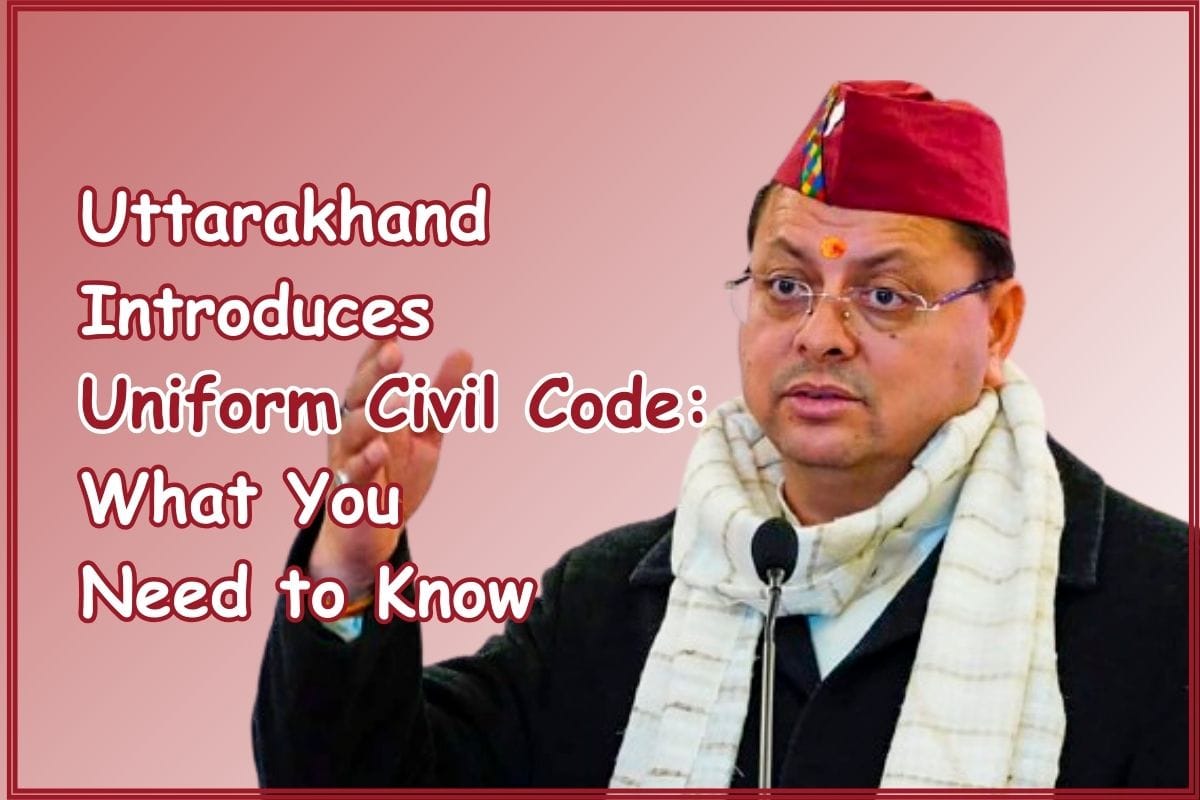
The Uttarakhand Assembly has brought in a new law called the Uniform Civil Code (UCC). Chief Minister Pushkar Singh Dhami believes this law will benefit everyone and align with Prime Minister Narendra Modi’s vision of unity and progress for all.
Background:
A special panel led by retired Supreme Court judge Ranjana Prakash Desai has worked on this law. They collected feedback from over 2.33 lakh people online and held more than 70 public meetings. This law covers various aspects of civil life.
Key Proposals:
The UCC suggests banning polygamy and child marriage, setting a fixed age for girls to marry, and making divorce procedures uniform. These proposals aim to ensure fairness and equality, especially for women.
Implications:
The UCC draft covers inheritance rights, marriage registration, and raising the marriage age for girls. Couples must register their marriages to access government benefits, encouraging legal documentation.
Scope of the Law:
This law will cover marriage, divorce, land, property, and inheritance laws, regardless of religion. If passed, Uttarakhand will be the first Indian state after Goa to implement such a law.
Inclusivity:
The proposed UCC extends adoption rights to all, including Muslim women. It aims to end practices like halala and iddat and promote live-in relationships. Live-in relationships will need legal registration, benefiting both men and women.
Legal Clarity:
Registration of live-in relationships will bring legal protection and reduce false cases. This move is supported by legal experts like former DGP of Uttarakhand, Ashok Kumar.
Exclusions:
The UCC draft does not include population control measures or the Scheduled Tribes, who make up 3% of Uttarakhand’s population.
Equal Rights:
The UCC ensures equal property rights for sons and daughters, regardless of legitimacy. It also treats adopted and biological children equally. In case of death, spouses, children, and parents will have equal property rights, unlike before.
The proposed UCC aims to bring fairness and equality in various aspects of civil life in Uttarakhand. It will provide legal protection and equal rights to all individuals, irrespective of their background.
About the Uniform Civil Code in India
The concept of a Uniform Civil Code (UCC) aims to ensure that all citizens, regardless of their religious affiliation, are treated equally under a single set of civil laws. This code covers various aspects of civil life, including marriage, divorce, maintenance, inheritance, adoption, and property succession. The underlying premise is to separate religion from law in modern society.
Historical Context:
The debate surrounding the UCC dates back to colonial India, where efforts were made to codify laws related to crimes, evidence, and contracts. However, personal laws for different religious communities remained outside this codification. Post-independence, leaders like Nehru and Ambedkar advocated for a UCC, but it was included in the Directive Principles of State Policy (DPSP) due to opposition and lack of awareness.
Legal Implications:
Article 44 of the Indian Constitution calls for the state to strive towards implementing a UCC. However, DPSPs are not enforceable by courts, indicating that while the constitution supports the idea of a UCC, its implementation is not mandatory. Despite this, judicial interventions, such as the Shah Bano case and subsequent legal proceedings, have highlighted the need for uniformity in civil laws.
Key Legal Cases:
Several landmark legal cases have shaped the discourse around the UCC, including:
- Shah Bano Case (1985): A pivotal case where a Muslim woman sought maintenance after divorce, leading to debates on the applicability of personal laws versus common civil laws.
- Daniel Latifi Case: Challenged the Muslim Women’s Act (MWA) and resulted in harmonization with Section 125 of the Criminal Procedure Code (CrPC) to ensure maintenance for divorced Muslim women.
- Sarla Mudgal Case: Addressed the issue of whether a Hindu husband, upon converting to Islam, could solemnize a second marriage without dissolving his first Hindu marriage.
- John Vallamattom Case: Dealt with the Constitutional validity of Section 118 of the Indian Succession Act, which imposed restrictions on property donation for non-Hindus.
Conclusion:
The debate on the Uniform Civil Code remains complex, involving legal, social, and religious considerations. While the constitution encourages the implementation of a UCC, its enforcement is subject to various challenges and debates. However, legal interventions and societal discussions continue to shape the discourse, reflecting ongoing efforts towards achieving equality and justice in civil laws.








Leave a Reply